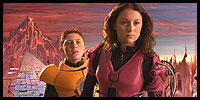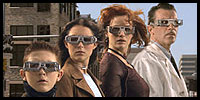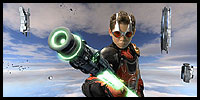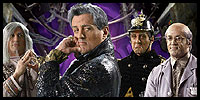
 |
|
Spy Kids 3-D: Game Over (2003) Cast: Daryl Sabara, Alexa Vega, Sylvester Stallone, Ricardo Montalban, Courtney Jines, Salma Hayek, Mike Judge, Emily Osment, Ryan Pinkston, Robert Vito, Bobby Edner, Alan Cumming, Elijah Wood, Antonio Banderas, Carla Gugino, Holland Taylor, Danny Trejo, George Clooney, Steve Buscemi, Bill Paxton, Tony Shalhoub 2003 – 85 minutes Rated: Reviewed by Dustin Putman, July 29, 2003.  2001's "Spy Kids" and 2002's "Spy Kids 2: The Island of Lost Dreams" may not have had what it takes to become modern family classics, but two things that could be counted on from writer-director Robert Rodriguez was a level of pure imagination at work and an inspiring theme concerning the bonds of family. With the latter thrown out the window and the former not as rampantly apparent, "Spy Kids 3-D: Game Over" is overcome by its gimmick—that of shooting in 3-D and requiring viewers to watch with old-fashioned cardboard glasses. This technique, not used in a big studio picture since 1991's "Freddy's Dead: The Final Nightmare," is sometimes visually stimulating and other times rather chintzy. Still, without the entertainment value of watching 3-D, this latest and reportedly final installment in the series would be a complete bust, both creatively and technically. As is, the film is a painless diversion, but also an undeniable rush job that makes enough woefully misguided storytelling decisions to place it as the worst of the three "Spy Kids" flicks.
2001's "Spy Kids" and 2002's "Spy Kids 2: The Island of Lost Dreams" may not have had what it takes to become modern family classics, but two things that could be counted on from writer-director Robert Rodriguez was a level of pure imagination at work and an inspiring theme concerning the bonds of family. With the latter thrown out the window and the former not as rampantly apparent, "Spy Kids 3-D: Game Over" is overcome by its gimmick—that of shooting in 3-D and requiring viewers to watch with old-fashioned cardboard glasses. This technique, not used in a big studio picture since 1991's "Freddy's Dead: The Final Nightmare," is sometimes visually stimulating and other times rather chintzy. Still, without the entertainment value of watching 3-D, this latest and reportedly final installment in the series would be a complete bust, both creatively and technically. As is, the film is a painless diversion, but also an undeniable rush job that makes enough woefully misguided storytelling decisions to place it as the worst of the three "Spy Kids" flicks.
 As the movie begins, young Juni Cortez (Daryl Sabara), once a much sought-after child spy, has left his family and the organization to find a different direction in his life. When he is informed that his older sister, Carmen (Alexa Vega), has become trapped in a dastardly new video game called "Game Over," programmed by the malevolent Toymaker (Sylvester Stallone), Juni has no choice but to go inside the game and save his sister. Once inside the increasingly dangerous levels, Juni finds that other kids are also unknowingly trapped, their minds taken over by the Toymaker.
As the movie begins, young Juni Cortez (Daryl Sabara), once a much sought-after child spy, has left his family and the organization to find a different direction in his life. When he is informed that his older sister, Carmen (Alexa Vega), has become trapped in a dastardly new video game called "Game Over," programmed by the malevolent Toymaker (Sylvester Stallone), Juni has no choice but to go inside the game and save his sister. Once inside the increasingly dangerous levels, Juni finds that other kids are also unknowingly trapped, their minds taken over by the Toymaker.
 The prologue of "Spy Kids 3-D: Game Over" is so clever as to falsely set the viewer up for something special, with the first picture's bad-guy-turned-good Fegan Floop (the excellent Alan Cumming) instructing when to put on and take off the 3-D glasses, and joking about how the 3-D effects have a tendency to give people headaches. The cameo from Alan Cumming (2003's "X2") is well-placed and endearing, which is more than can be said for the careless and mystifying misuse of every other character besides Juni. The first film's concept of a spy family was carried over, if abbreviated, in the second effort, but here Juni's parents, Gregorio (Antonio Banderas) and Ingrid (Carla Gugino), are next to nonexistent. Banderas (2002's "Femme Fatale") and Gugino (2001's "The One") appear for a dreadfully embarrassing two-minute walk-on, while previous series lead costar Alexa Vega (as sister Carmen) is only on hand for the third act. Other returning actors, such as Emily Osment and Matthew O'Leary (2002's "Frailty") as fellow spy kids Gerti and Gary Giggles, Steve Buscemi (2001's "Ghost World") as mad scientist Romero, and Holland Taylor (2001's "Legally Blonde") as Grandma Cortez, are relegated to parts just as small or smaller in favor of new, and less interesting characters.
The prologue of "Spy Kids 3-D: Game Over" is so clever as to falsely set the viewer up for something special, with the first picture's bad-guy-turned-good Fegan Floop (the excellent Alan Cumming) instructing when to put on and take off the 3-D glasses, and joking about how the 3-D effects have a tendency to give people headaches. The cameo from Alan Cumming (2003's "X2") is well-placed and endearing, which is more than can be said for the careless and mystifying misuse of every other character besides Juni. The first film's concept of a spy family was carried over, if abbreviated, in the second effort, but here Juni's parents, Gregorio (Antonio Banderas) and Ingrid (Carla Gugino), are next to nonexistent. Banderas (2002's "Femme Fatale") and Gugino (2001's "The One") appear for a dreadfully embarrassing two-minute walk-on, while previous series lead costar Alexa Vega (as sister Carmen) is only on hand for the third act. Other returning actors, such as Emily Osment and Matthew O'Leary (2002's "Frailty") as fellow spy kids Gerti and Gary Giggles, Steve Buscemi (2001's "Ghost World") as mad scientist Romero, and Holland Taylor (2001's "Legally Blonde") as Grandma Cortez, are relegated to parts just as small or smaller in favor of new, and less interesting characters.
 Daryl Sabara equips himself with charming aplomb as Juni Cortez, a pint-sized hero who, nonetheless, is getting old enough to find a girlfriend this time around (in the form of Demetra, a tough girl stuck in the video game, played by newcomer Courtney Jines. As the villainous Toymaker, Sylvester Stallone (2000's "Get Carter") has fun with his comedic side, but is unconvincing as someone who is threatening. Stallone always seems to be kidding around, rather than developing a real character.
Daryl Sabara equips himself with charming aplomb as Juni Cortez, a pint-sized hero who, nonetheless, is getting old enough to find a girlfriend this time around (in the form of Demetra, a tough girl stuck in the video game, played by newcomer Courtney Jines. As the villainous Toymaker, Sylvester Stallone (2000's "Get Carter") has fun with his comedic side, but is unconvincing as someone who is threatening. Stallone always seems to be kidding around, rather than developing a real character.
 The strongest element of "Spy Kids 3-D: Game Over" is the accurate and often thrilling way director Robert Rodriguez transforms the film into a video game come to life. The 3-D effects are a step or two above the norm, if only because there are some truly effective uses of it without calling attention to themselves of being there only "because" it's for 3-D shock value. Most everything else, unfortunately, lacks the emotion, magic, and creativity of its predecessors. The film is a cold experience, sloppy and mechanical, with its every plot development predictable. There is no spontaneity, and no freshness. A warning sign Robert Rodriguez should have recognized early on is that you cannot title a movie "Spy Kids 3-D: Game Over" when it has nothing at all to do with spying. At least the "Game Over" part is probably truthful, in terms of this quality-decreasing trilogy.
The strongest element of "Spy Kids 3-D: Game Over" is the accurate and often thrilling way director Robert Rodriguez transforms the film into a video game come to life. The 3-D effects are a step or two above the norm, if only because there are some truly effective uses of it without calling attention to themselves of being there only "because" it's for 3-D shock value. Most everything else, unfortunately, lacks the emotion, magic, and creativity of its predecessors. The film is a cold experience, sloppy and mechanical, with its every plot development predictable. There is no spontaneity, and no freshness. A warning sign Robert Rodriguez should have recognized early on is that you cannot title a movie "Spy Kids 3-D: Game Over" when it has nothing at all to do with spying. At least the "Game Over" part is probably truthful, in terms of this quality-decreasing trilogy.
|
© 2003 by Dustin Putman |














